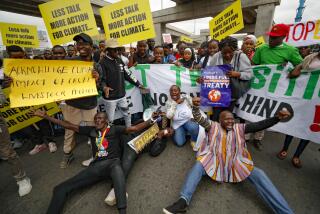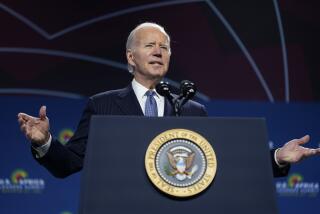Africa Has a Future, and World Has a Stake
- Share via
Most news from Africa seems to go from bad to worse. But the economic news, while far from sunny, shows patches of promise and lots of potential.
Africa is the sick continent--literally so in that AIDS affects 25 million people in sub-Saharan Africa. And figuratively so in that civil strife and rampant killings over diamonds and power continue in some African countries.
Africa is poor, with 13% of the world’s population and only 2% of its economic output.
But it is also varied, an enormous collection of 53 countries. A closer look provides a more realistic picture of progress, setback, struggle and hope.
Some countries that suffered civil strife in the past are now achieving impressive economic development. Ghana and Uganda, with great agricultural resources, are both growing rapidly. Nigeria, weakened by strife despite oil riches, is set for progress under a new government.
New oil developments are occurring in Nigeria, Angola and other countries as Africa’s oil is again important to the world.
Global investments, whether by corporations or investment funds, are relatively few in Africa and focused mainly on South Africa, the source of cars and steel for Africa as well as diamonds for the world. South Africa is building its post-apartheid economy slowly but surely. Egypt, at the other end of the vast continent, also attracts world investment as it tries to create a modern economy.
Most of Africa, including areas of South Africa and Egypt, is in a stage that economists call pre-development, lacking organizations and facilities necessary to put investments to work productively. It is not a place to make a quick buck, but one that demands attention and understanding because Africa will be making an economic transition in the next 10 years.
How it makes that transition is important because Africa is environmentally critical--the world’s largest remaining area of jungle and biodiversity. How Africa develops will affect the economies of more countries than is generally realized.
The continent today is not without investment possibilities. The Morgan Stanley Dean Witter Africa fund, which has $155 million in assets, is invested in Mobinil, an Egyptian cellular telephone company, and in Rembrandt Group of South Africa, a tobacco company that has diversified into telecommunications. The fund, managed out of New York by Jaideep Khanna and Michael Schwabe, who travel in Africa half of the year, also invests in the State Bank of Mauritius, based on the small, apparel-making island republic in the Indian Ocean.
Calvert Group’s New Africa fund, which has only $5 million in assets, has investments in Billiton, a South African metals company.
The Reinvest in South Africa fund, a Philadelphia-based organization, is allied with institutional investors in that country. The fund makes loans to small businesses, mainly in South Africa’s industrially powerful Port Elizabeth and East London areas on the eastern shore of the Cape of Good Hope.
General Motors and DaimlerChrysler are once again investing in automobile production in those areas. Volkswagen is siting production of its Golf model cars there, reports Alfred Da Costa, head of Port Elizabeth’s chamber of commerce.
Small businesses are opening up to serve the big auto makers and to give employment and training to the multitudes of young people coming into the work force in South Africa, where unemployment runs to 30%. “The economy is turning around here,” Da Costa says. “We’re exporting cars to China and other countries.”
They should be exporting to neighboring Zimbabwe and other African countries, the natural and future markets for South Africa. But Zimbabwe, torn by racial strife and government mismanagement, “has an economy going down the tubes,” says Donald McHenry, former U.S. ambassador to the United Nations and now professor at Georgetown University’s School of Foreign Service.
Yet Mozambique, a South Africa neighbor on the Indian Ocean, has an economy that has been growing 8% annually for years, McHenry says, pointing up the disparities in Africa. “Mozambique had devastating floods this year but kept right on going,” he says.
What does Africa need? It needs capital in the form of relief from debts incurred years ago. And it needs fresh investments to help build industrial infrastructure, create health-care systems and educate its people.
The presidents of Nigeria, South Africa and Algeria are in Okinawa, Japan, this weekend, talking to the Group of 8 leaders of the industrial countries about the need for government and private lenders to alleviate debt burdens on poor countries.
They are not asking for handouts. Many African governments seek the help of U.S. law firms and economic experts in restructuring their accounts so they may qualify for job-creating investment from world industry. “We see a lot of them, they recognize the need for investment,” says Daniel Levin, partner of Levin & Srinivasan, a New York law firm.
But in a world of many nations competing for investment, what does Africa have to offer? It has environmental resources. In a grand planetary sense, the jungles of Africa absorb the carbon dioxide exhausts of the developed world’s engines. Africa’s lack of development leaves its forests and many species of plant and animal life undisturbed.
“The rest of the world gets a free ride from Africa,” says economist Glenn Yago of the Milken Institute, an economic think tank in Santa Monica. The world’s aim should be to encourage African development in ways that prevent desperately poor people from chopping down all the mahogany in the rain forest and reducing the varieties of species in their countries.
That means debt relief and help in modernizing governments and institutions to put investment to productive use, as Uganda, Ghana and Mozambique have done. “It’s investment that assigns a monetary value to environmental assets, so that world organization can more easily make judgments about them,” Yago explains.
It’s a fresh perspective on Africa’s problems, which is what the continent needs. It should be remembered that Africa, for all its turmoil, is coming from a deep hole left by centuries of European rule. When Mozambique, for example, gained independence from Portugal in 1990, it had 85% illiteracy. Since that time, the still-poor country has reduced the illiteracy rate to just over 50% by educating its young people.
Africa’s potential, like the continent itself, is vast.
Africa’s Anemic Economies
Africa has 24% of the world’s land and as many people as the Americas, but its economies are the world’s poorest.
Source: Milken Institute
*
James Flanigan can be reached at jim.flanigan@latimes.com.
More to Read
Sign up for Essential California
The most important California stories and recommendations in your inbox every morning.
You may occasionally receive promotional content from the Los Angeles Times.













